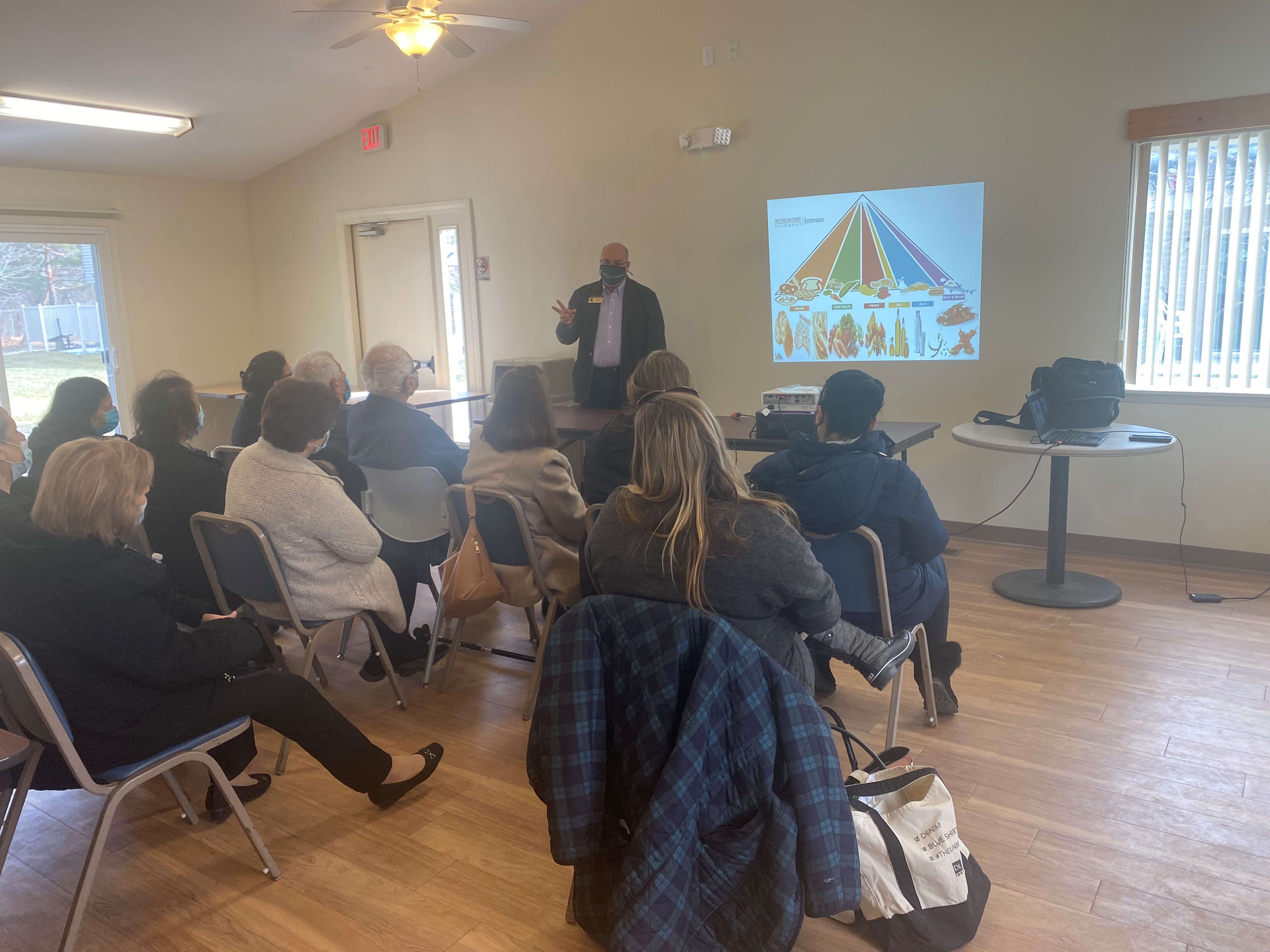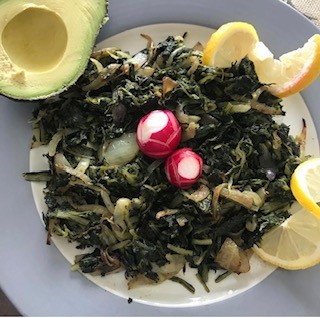"We know where they are coming from"
MSU Extension's educators and instructors reach refugees and immigrants in a meaningful way.


In a small but modern classroom within the Arab American and Chaldean Council (ACC), about five miles from Detroit, Michigan State University Extension instructor Ghaida Batarseh Havern distributes ServSafe Food Handler certificates to her course graduates. Participants eagerly accept this document reflecting their successful completion of the course and knowledge gained.
“They seem so happy and proud of themselves,” Havern said. One of her recent participants, a man from the Congo, shared with Havern that he recently lost his job due to a language barrier. He was happy to receive this certificate and build his knowledge base, as he feels it will help him find new employment in the food service industry.
In her programming, Havern also includes introductory content on Michigan’s Cottage Food Law. This legislation allows people to prepare and sell types of food from their home or unlicensed kitchen, setting people up to be food entrepreneurs.
Havern, a newer educator with MSU Extension, combines her food safety-focused programming with long-standing colleague Sulaiman Mansour, who provides nutrition education. Mansour, an MSU Extension community nutrition instructor, has played a key role in setting up partnerships with organizations like ACC, who support refugee and immigrant adults and families. Through relationships with the Arab Community Center for Economic and Social Services, or ACCESS, the largest Arab American community nonprofit in the U.S., the U.S. Committee for Refugees and Immigrants of Detroit, Jewish Family Services, Catholic Charities and Samaritas, Sulaiman has been able to make significant connections with refugees and immigrants arriving in Southeast Michigan for ten years.
One reason Mansour and Havern are able to reach and relate to their audience is because of their personal background and experiences. Mansour was born in Africa’s west coast of Sierra Leone and his father, Fadel, was Lebanese.
“When I came to the States, I started from zero," he said. “I worked a lot. It’s not easy. When you are coming from war, you lose a lot. I see myself in each and every refugee.” Prior to joining MSU Extension, Mansour worked for ACCESS, supporting new refugee health screening.
Havern immigrated to the U.S from Jordan at the age of seven with her parents and sisters.
“I understand Arab culture," she said. "If I meet an Arab person, I can relate to them…they remind me of where I came from. I have a bond with refugees, because I come from the same place. My roots are where their roots are too.”
With Michigan being home to one of the largest populations of Middle Eastern people in the United States and recently committing to resettling 1,600 Afghan refugees, having staff who can tailor and adapt programming while understanding and interacting effectively with people from these cultures is critical. Mansour and Havern understand that connecting with their audiences in meaningful ways goes beyond translation of material. Many refugees have experienced trauma due to extremely stressful events associated with being forcibly displaced from their country of origin.
“I don’t speak loud or instruct. I am careful of my tone and conscious of my voice,” says Mansour, who also often shares with his classes that he is there to serve and support them. Mansour peppers his educational visuals with foods common among Middle Eastern cultures and makes some room to highlight the U.S Department of Agriculture “MyPlate” in Arabic. In addition to being sensitive with their approach and acknowledging traditional food practices among different cultures, Mansour and Havern also market and promote their program offerings in ways they feel best resonate with their audience and features the cultural value of success.
Havern and Mansour use their programming to highlight the connection between individual health and wellness and skills such as safe food handling and establishing a food business, which can lead their participants to successful employment.
“They want to succeed. They want to be independent," said Mansour, who recalls a recent participant graduate of the bundled program who is now preparing to launch a frozen Middle Eastern food line to large retail outlets. Stories like this fuel a purpose in his work, Mansour says.
With the influx of more refugees in Michigan in the last several months, resettlement agencies are busy guiding new families through a multitude of services, including connecting them to housing. Mansour recently offered newly arriving refugees who were temporarily living in a hotel virtual nutrition education and orientation to the American food system, via the messaging software WhatsApp and Zoom video conferencing.
“Resettlement agencies are overwhelmed," he said. "We are able to offer a valuable resource."
Mansour and Havern have additional MSU Extension colleagues who share their skills for helping to meet the needs of growing, ethnically diverse communities in the Detroit metro area. Community nutrition instructor Amy Safoui and health program instructor Haya Elzib offer programming specific to nutrition and social and emotional wellness.
Safoui recently started a program for parents of young children at ACCESS in Dearborn, where she presents content including the importance of eating a variety of colorful foods, food budgeting and label reading, and tips for feeding young children. Her virtual classes offered via Zoom have increased accessibility, as she shares how mothers of young children with no or limited transportation can take part without leaving their home.
Born in Lebanon, Safoui recounts how hard it can be to navigate a new country, often without extended family. This experience drives her empathy with the new families she meets.
“I remind them, I was like you too," she said. "That helps build trust. When I came here, I had no English. I went to a grocery store where I could walk to get pistachios for a recipe. I didn’t know how to say pistachio and I used my hands to act out the opening of a pistachio nut.”
Since many of the participants in her classes know how to cook, Safoui doesn't focus on things like knife skills in her class, instead emphasizing topics like food budgeting. She steers new families towards prioritizing healthy choices and avoiding the lure of the abundance of soda and other processed foods. When she’s not teaching, Safoui loves to cook traditional food, like her Hindbeh recipe.

“People request my fried kibbeh," she said. "It is stuffed with bulger wheat, pine nuts, and onions."
Elzib just started her role in February 2022 and is currently getting acquainted with the social and emotional health programming she intends to soon offer in local communities. She is excited to deliver programming on topics such as anger management, mindfulness, chronic disease prevention and healthy sleep patterns, which align well with her passion for public and community health.
Prior to joining MSU Extension, Elzib worked with a non-profit supporting refugee women and children and is excited about establishing further connections with similar organizations.
“I speak Arabic and we can connect on this shared language and culture,” she said. When asked about what she’s most looking forward to in her role, Elzib imagines the impact she’ll have on supporting behavior and habits that lead to healthier communities. “It can be a gift to be able to help people in times of stress or anger. As an MSU Extension instructor, I can give them the tools they need. I feel this is so rewarding.”
Learn more about how Michigan State University Extension helps to improve lives through an educational process that applies knowledge to critical issues, needs and opportunities. For more information, visit extension.msu.edu.
Sarah Eichberger is an educator with Michigan State University Extension. From 2006 to 2010, Eichberger had the privilege of working exclusively with refugee families resettling in Chicago. Eichberger thanks her colleagues highlighted in this article for sharing their stories and experiences.



 Print
Print Email
Email

